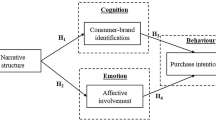Abstract
Brand activism has become a popular term for describing how brands are becoming involved with controversial sociopolitical issues. The activist brand is thus characterised by its engagement with controversy and understood in and through macro-level cultural oppositions which it continuously orbits and positions itself against. The purpose of this paper is to contribute with a conceptual gaze at the activist brand's inherent controversy that enables an understanding of the online micro-level dynamics and processes that transform the online activist brand. Drawing on a narrative approach, the paper develops an ante- and counternarrative framework to explain how these complex micro-level dynamics and processes of resistance transform the brand. The framework allows us to approach the activist brand as the result of a complex network of antenarratives and counternarratives, which the brand flows in and out of, retells, supports, and resists.





Similar content being viewed by others
Notes
BBC has reported that the campaign caused numerous complaints among viewers. For instance, the Australian’s industry regulators received more than 600 complaints from viewers who found the campaign inappropriate, which was the highest number for any advertisements in 2019 (BBC, 18.09.2019).
References
Aaker, J.L. 1997. Dimensions of brand personality. Journal of Marketing Research 34 (3): 347–356.
Andersen, S.E., and T.S. Johansen. 2021. Corporate citizenship: challenging the corporate centricity in corporate marketing. Journal of Business Research 131: 686–699.
Bamberg, M.G.W., and M. Andrews, eds. 2004. Considering counter-narratives: Narrating, resisting, making sense. Philadelphia: John Benjamins.
Bamberg, M.G.W., and Z. Wipff. 2020. Reconsidering counter-narratives. In The Routledge Handbook of Counter-Narratives, ed. K. Lueg and M.W. Lundholt, 71–83. London: Routledge.
Berger, R. J. and Quinney, R. 2005. The narrative turn in social inquiry. In: Berger, R.J and Quinney, R. (eds.) Storytelling sociology: Narrative as social inquiry, 1-11. Boulder: Lynne Rienner Publishers.
Bergwell, S. 2006. Brand Ecosystems: Multilevel brand interaction. In Brand Cultures, ed. J. Schroeder and M. Salzer-Mörling, 166–176. New York: Routledge.
Boje, D.M. 1991. The storytelling organization: a study of story performance in an office-supply firm. Administrative Science Quarterly 36: 106–126.
Boje, D.M. 1995. Stories of the storytelling organization: a postmodern analysis of disney as Tamara-Land. Academy of Management Journal 38 (4): 997–1035.
Boje, D.M. 1998. The postmodern turn from stories-as-objects to stories-in-context methods. Res Methods Forum 3: 1–8.
Boje, D.M. 2001. Narrative methods for organizational & communication research. Sage.
Boje, D. M. 2007. The antenarrative turn in narrative studies. In Zachry, M. and Thralls, C. (eds.). Communicative practices in workplaces and the professions: Cultural perspectives on the regulation of discourse and organizations. Taylor & Francis Group, pp. 219-237.
Borden, N. 1964. The concept of the marketing mix. In Science in Marketing, ed. G. Schwartz, 2–7. New York: Wiley.
Brodie, R.J., M. Benson-Rea, and C.J. Medlin. 2017. Branding as a dynamic capability: strategic advantage from integrating meanings with identification. Marketing Theory 17 (12): 183–199.
Conejo, F., and B. Wooliscroft. 2015. Brands defined as semiotic marketing systems. J Macromarketing 35 (3): 287–301.
Csaba, F.F. and Bengtsson, A. 2006. Rethinking identity in brand management. In Schroeder, J. and Mörling, M. S. (eds.). Brand Culture. Routledge, pp.121-136.
Deseriis, M. 2011. Online activism as a participatory form of storytelling. In Art and activism in the age of globalization, ed. L. De De Cauter, R. Roo, and K. Vanhaesebrouck, 250–263. Rotterdam: NAi Publishers.
Dias, P., and R. Cavalheiro. 2022. The role of storytelling in the creation of brand love: the PANDORA case. Journal of Brand Management 29 (1): 58–71.
Fournier, S. 1998. Consumers and their brands: developing relationship theory in consumer research. Journal of Consumer Research 24 (4): 343–373.
Fournier, S., and J. Avery. 2011. The uninvited brand. Business Horizons 54 (3): 193–207.
Frandsen, S., T. Kuhn, and M.W. Lundholt. 2017. Introduction. In Counter-narratives and organization, ed. S. Frandsen, T. Kuhn, and M.W. Lundholt, 1–11. New York, NY: Routledge.
Fuchs, C., Hofkirchner, W., Schafranek, M., Raffl, C., Sandoval, M. and Bichler, R. 2010. Theoretical foundations of the Web: Cognition, communication and co-operation. Towards an understanding of Web 1.0, 2.0, 3.0, Future Internet 2: 41–59.
Georgakopoulou, A. 2017. Small stories research: A narrative paradigm for the analysis of social media. In: Sloan, L. and Quan-Haase, A. (eds.). The Sage Handbook of social media research methods. Sage Publications Ltd, pp. 266–281.
Hansen, R.H. 2010. The narrative nature of place branding. Place Branding and Public Diplomacy 6 (4): 268–279.
Hatch, M.J., and M. Schultz. 2010. Towards a theory of brand co-creation with implications for brand governance. Journal of Brand Management 17 (8): 590–604.
Heldman, C. 2017. Protest politics in the marketplace: consumer activism in the corporate age. Ithaca: Cornell University Press.
Holt, D.B. 2002. Why do brands cause trouble? A dialectical theory of consumer culture and branding. Journal Consumer Research 29 (1): 70–90.
Holt, D. 2016. Branding in the age of social media. Harvard Business Review 94 (3): 40–50.
Holt, D. and Cameron, D. 2010. Cultural strategy: Using innovative ideologies to build breakthrough brands. OUP Oxford.
Holt, D. B. 2004. How brands become icons: The principles of cultural branding. Harvard Business Press.
Huang, C., and R. Guo. 2021. The effect of a green brand story on perceived brand authenticity and brand trust: The role of narrative rhetoric. Journal of Brand Management 28 (1): 60–76.
Ikäheimo, J.P. 2021. Arctic narratives: Brewing a brand with neolocalism. Journal of Brand Management 28 (4): 374–387.
Jaakkola, E. 2020. Designing conceptual articles: Four approaches. AMS Review 10: 18–26.
Jenkins, R. 2006. Convergence culture: Where old and new media collide. NY University Press.
Key, T. M., Keel, A. L., Czaplewski, A. J. and Olson, E. M. 2021. Brand activism change agents: Strategic storytelling for impact and authenticity. Journal of Strategic Marketing, e-pub, 1–17.
Klein, N. 1999. No Logo: Brands, globalization and resistance. Knopf Canada and Picador.
Koch, C.H. 2020. Brands as activists: The Oatly case. Journal of Brand Management 27 (5): 593–606.
Kotler, P. 1997. Marketing management: Analysis, planning, implementation, and control, 9th ed. Upper Saddle River: Prentice Hall.
Kozinets, R.V. 2002. Can consumers escape the market? Emancipatory illuminations from burning man. Journal of Consumer Research 29 (1): 20–38.
Kozinets, R.V., and J.M. Handelman. 2004. Adversaries of consumption: Consumer movements, activism, and ideology. Journal of Consumer Research 31: 691–704.
Kozinets, R.V., K. de Valck, A.C. Wojnicki, and S.J.S. Wilner. 2010. Networked narratives: Understanding word-of-mouth marketing in online communities. Journal of Marketing 74: 71–89.
Lukka, K. and E. Vinnari. 2014. Domain theory and method theory in management accounting research. Accounting, Auditing & Accountability Journal 27(8): 1308–1338.
Manfredi-Sánchez, J.L. 2019. Brand Activism. Communication & Society 32 (4): 343–359.
Mills, A.J., and K. Robson. 2020. Brand management in the era of fake news: Narrative response as a strategy to insulate brand value. Journal of Product & Brand Management 29 (2): 159–167.
Mukherjee, S., and N. Althuizen. 2020. Brand activism: Does courting controversy help or hurt a brand? International Journal of Research in Marketing 37 (4): 772–788.
Muniz, A.M., and T.C. O’Guinn. 2001. Brand Community. Journal of Consumer Research 27 (4): 412–432.
Rowley, J., and S. Hanna. 2020. Branding destinations: Symbolic and narrative representations and co-branding. Journal of Brand Management 27 (3): 328–338.
Schmidt, H.J., N. Ind, F. Guzmán, and E. Kennedy. 2021. Sociopolitical activist brands. Journal of Product & Brand Management 31 (1): 40–55.
Schouten, J., and J.H. McAlexander. 1995. Subcultures of consumption: An ethnography of the New Bikers. Journal of Consumer Research 22 (June): 43–61.
Schroeder, J.E. 2009. The cultural codes of branding. Marketing Theory 9 (1): 123–126.
Sibai, O., L. Mimoun, and A. Boukis. 2021. Authenticating brand activism: Negotiating the boundaries of free speech to make a change. Psychology & Marketing 38 (10): 1651–1669.
Spry, A., B. Figueiredo, L. Gurrieri, J.A. Kemper, and J. Vredenburg. 2021. Transformative branding: A dynamic capability to challenge the dominant social paradigm. Journal of Macromarketing 41 (4): 531–546.
Swaminathan, V., A. Sorescu, J.B.E. Steenkamp, T.C.G. O’Guinn, and B. Schmitt. 2020. Branding in a hyperconnected world: Refocusing theories and rethinking boundaries. Journal of Marketing 84 (2): 24–46.
Vredenburg, J., S. Kapitan, A. Spry, and J.A. Kemper. 2020. Brands taking a stand: Authentic brand activism or woke washing? Journal of Public Policy & Marketing 39 (4): 444–460.
Acknowledgements
The authors would like to thank the reviewers for providing valuable comments and suggestions, which helped us in improving the quality of the manuscript.
Author information
Authors and Affiliations
Corresponding author
Ethics declarations
Conflict of interest
On behalf of all authors, the corresponding author states that there is no conflict of interest.
Additional information
Publisher's Note
Springer Nature remains neutral with regard to jurisdictional claims in published maps and institutional affiliations.
Rights and permissions
Springer Nature or its licensor (e.g. a society or other partner) holds exclusive rights to this article under a publishing agreement with the author(s) or other rightsholder(s); author self-archiving of the accepted manuscript version of this article is solely governed by the terms of such publishing agreement and applicable law.
About this article
Cite this article
Andersen, S.E., Johansen, T.S. The activist brand and the transformational power of resistance: towards a narrative conceptual framework. J Brand Manag 31, 140–152 (2024). https://doi.org/10.1057/s41262-023-00320-1
Revised:
Accepted:
Published:
Issue Date:
DOI: https://doi.org/10.1057/s41262-023-00320-1




